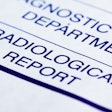The U.K. Royal College of Radiologists (RCR) has published a document called Sedation, analgesia and anaesthesia in radiology.
The key points in the 28-page document are:
- An appropriately trained and credentialed team should administer sedation and analgesia.
- A multidisciplinary sedation committee should exist in each institution administering sedation and analgesia.
- Patients requiring sedation should undergo pre-procedure assessment and have a sedation plan.
- Sedated patients should be appropriately monitored.
- Resuscitation equipment and reversal agents should be readily available.
- A properly staffed recovery area and formalized communication are essential for safe aftercare and discharge.
- Regular audits of practice should be performed.
- All sedation-related complications should be recorded.
- Sedation-related adverse outcomes should be discussed with the patient in line with the U.K. General Medical Council Duty of Candour recommendation once the effects of the sedation have worn off.
This edition replaces the previous version published in 2018 and is aimed toward radiology team members who use sedation in their line of work.
The updated edition focuses more on defining standards of care for healthcare organizations and departments to ensure sedation and analgesia practice is safe and effective. The lead author of the guidance is Dr. Narayan Karunanithy from Guy's and St Thomas' NHS Foundation Trust in London.
The full guidance can be accessed here.



















